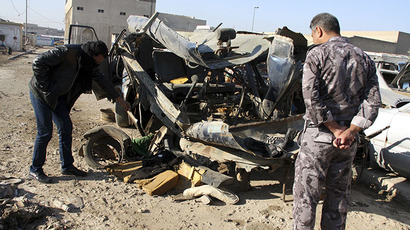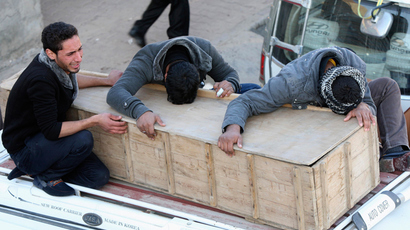At least 37 dead in bombings in Baghdad’s Christian areas
Bomb attacks at Christmas that targeted Christian areas of the Iraqi capital, Baghdad, have left at least 37 people dead. The biggest blast happened near a church after a Christmas service.
RT has been following the deadly violence that swept the country in 2013 in a special project.
The assaults included a car bomb that went off next to a Christian church in the Doura district of the Iraqi capital after a Christmas service, a police officer confirmed, according to AP.
The attack killed at least 26 people and wounded 38 others. Most of the victims were Christians.
Earlier on Wednesday, two bombs exploded simultaneously at an outdoor market in the same area of Doura, killing 11 people and wounding 21 others. The figures were confirmed by a medical official.
However, there are conflicting reports regarding the number of victims of today’s violence, as well as the targets of the blasts.
Interior Ministry spokesman Saad Maan told AFP that “two roadside bombs” exploded in the market, killing 35 people and injuring 56 others.
The agency also reported that Iraqi security officials had initially said that a car bomb targeted St. John’s Catholic Church in Baghdad, in addition to the market blasts. However, Maan later denied the report.
“The attack was against a...market and not a church,” Maan said, adding that “the targeted area is a mix of Muslims and Christians.”
The Iraq-based leader of Chaldean Catholic Church, Louis Sako, also believes the church was not the target. He said the car bomb went off after Christmas mass, but that none of the worshippers were injured.

A policeman who was on duty in the area of the attacks told Reuters that worshippers began leaving the church after hearing sounds of the first blast.
“A car parked near the church exploded when the families were hugging each other goodbye before leaving. The blast was powerful,” he said. “Bodies of women, girls and men were lying on the ground covered in blood. Others were screaming and crying while they were trying to save some of their wounded relatives.”
No one immediately claimed responsibility for the blasts.
A string of car bombs, shootings, and suicide attacks has shaken the country, killing many Shiite Muslim pilgrims in the week before the Shiite holy day of Arbaeen - which coincided with Christmas Eve this year.
The American Embassy in Baghdad condemned the bombings “in the strongest terms.” It said in a statement that Christians in Iraq have suffered “deliberate and senseless targeting by terrorists for many years, as have many other innocent Iraqis.”
The diminishing Christian minority (400,000-600,000 people) in Iraq has frequently been the target of attacks, including a major church bombing in 2010 which left dozens dead.
Before the US-led invasion in 2003, there were around 1.5 million Iraqi Christians, but the number has since decreased by about a half, as Christians continue to leave the country.
“The future is very critical because of immigration,” human rights activist William Warda said, as quoted by Reuters. He estimates that 10 to 20 Christians are fleeing the country each day “because there is no sign of a bright future.”
Sabah al-Mukhtar, the president of the Arab Lawyers Association in the UK, believes the Iraqi government is too preoccupied with an internal power struggle to deal with sectarian strife.
“You have Maliki who is the new dictator in Iraq and you have other politicians who want to remove him so they can stay in his place. And there is what’s called the political process which is really a sham. It is not a real political process because you cannot have a political process when you are losing 20-30 people a day - this is a civil war. The fault at the end of the day must lie with the government,” he told RT.














